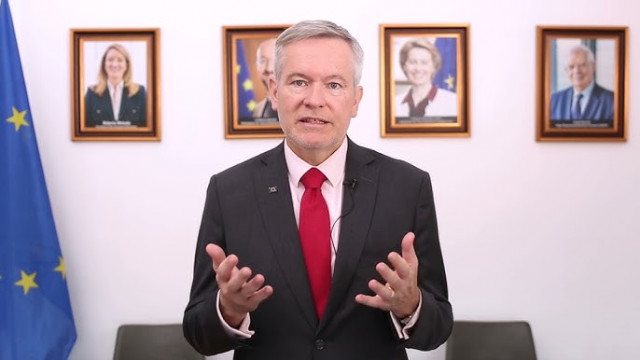ABUJA, Nigeria - The European Union (EU) Ambassador to Nigeria and the Economic Community of West African States (ECOWAS), Gautier Mignot, emphasized the importance of electing Nigeria’s leaders through popular vote rather than judicial rulings.
Mignot made his remarks in Abuja during the unveiling of a report titled “From Ballot to the Courts: Analysis of Election Petition Litigation from Nigeria’s 2023 General Elections,” compiled by the Policy and Legal Advocacy Centre (PLAC).
Represented by Ruben Alba, the acting Head of Cooperation at the EU Delegation to Nigeria and ECOWAS, Mignot highlighted that this trend undermines the capacity of the Independent National Electoral Commission (INEC) to conduct well-organized elections, largely due to logistical issues.
He added that conflicting court decisions threaten the administration of elections, complicating the enforcement of INEC's regulatory duties.
He pointed out that democracy heavily relies on an effective judicial system, insisting that the judiciary should fulfill its constitutional obligations and bolster the protection of democratic principles and the rule of law.
“The vital function of the judiciary in Nigeria’s democratic framework has been validated by numerous impactful court rulings, which have reinforced and advanced democracy in the country.
“Put differently, the judiciary's involvement in the electoral process has undoubtedly contributed to meaningful and essential changes in Nigeria’s development journey; however, there is still much work to be done.
It is equally crucial to recognize that a functional judicial system is a shared responsibility. While the judiciary plays a pivotal role in ensuring prompt, effective, and transparent justice delivery, citizens must stay informed about their rights as guaranteed by the Constitution to hold the system accountable.
With respect to electoral judiciary, sufficient information is necessary to ensure adherence to the true spirit of the law, preventing cases from being dismissed solely on technical grounds. Moreover, conflicting legal decisions related to the same circumstances significantly undermine the quality of Nigeria’s democratic experience and voter confidence. As previously stated, leaders ought to be chosen through the ballot, not the courts.”
Earlier, Clement Nwankwo, the Executive Director of PLAC, noted that the report provides a thorough evaluation of the rulings made by the Election Petition Tribunals, the Court of Appeal, and the Supreme Court regarding petitions arising from the general elections conducted in February and March 2023.




















